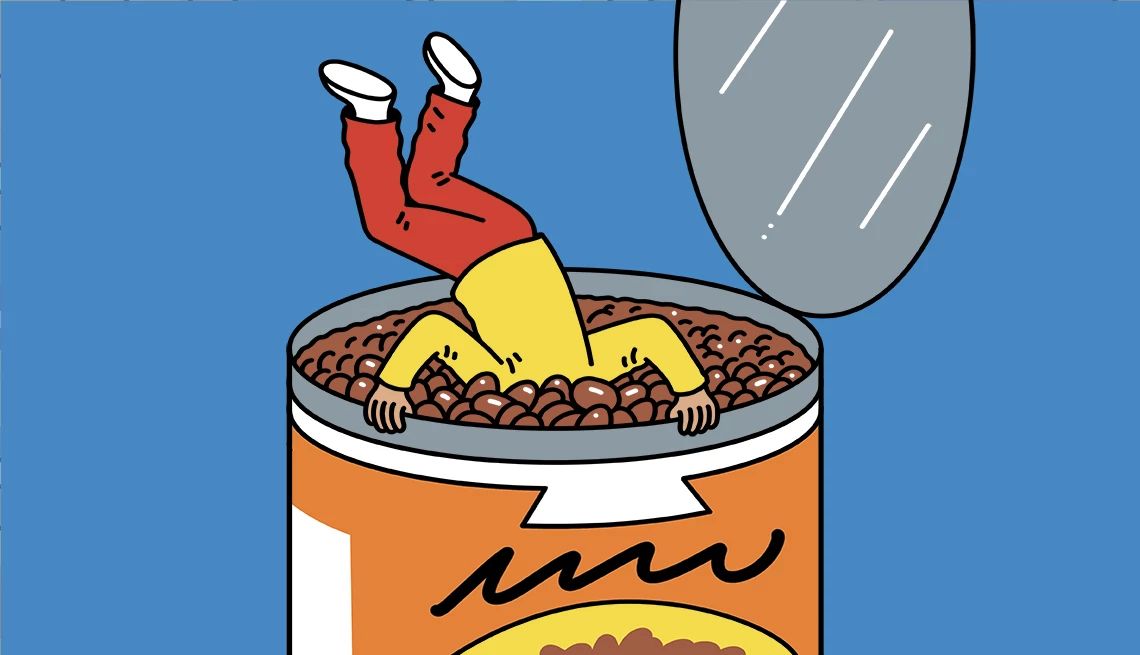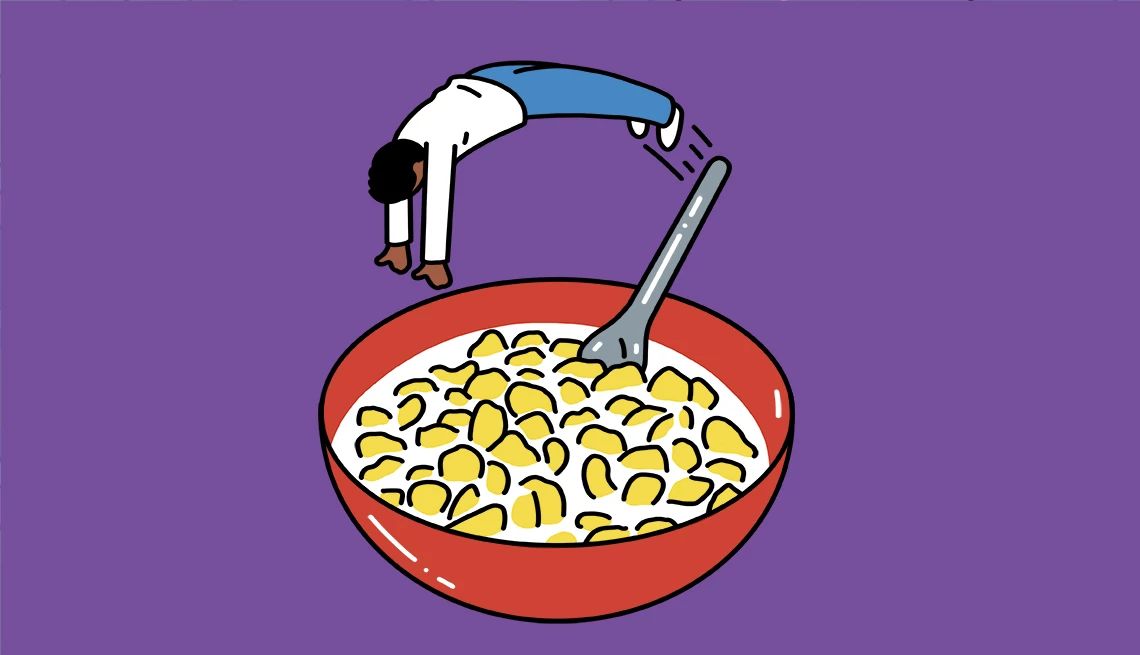AARP Hearing Center


Processed foods are all bad news, right? Not necessarily.
To be sure, salty chips, frozen pizza, and sugary sodas and cereals aren’t nutritional all-stars. In fact, more than 70 percent of the sodium in the typical American diet comes from packaged and prepared foods, according to the Food and Drug Administration (FDA).
Americans love their processed foods. A recent study by the NYU School of Global Public Health found that ultra-processed food consumption has risen across nearly every segment of the U.S. population over the past 20 years and may be a big contributor to the obesity epidemic.
And, according to a 2023 report from the National Poll on Healthy Aging at the University of Michigan, about 13 percent of people ages 50 to 80 — especially women and those who are lonely, overweight or in fair or poor health — are actually addicted to processed foods. That’s a concern because recent studies have linked highly processed foods to a greater overall risk of cancer (especially breast and ovarian cancer), dementia, type 2 diabetes and heart disease.
But there are plenty of healthy options — if you’re choosy and make it a habit to read ingredient lists.
What is a processed food?
Remember, not all processed foods are alike. According to the Department of Agriculture, processed foods are any raw agricultural commodities that have been altered from their original state. That can include cutting, drying, freezing, pasteurizing or packaging.
The Academy of Nutrition and Dietetics places these foods on a continuum, says Nancy Farrell Allen, an Academy of Nutrition and Dietetics registered dietitian: Those that are minimally processed, like bagged spinach, eggs, oats, pasta and plain roasted nuts; those processed at their peak, like canned tomatoes, tuna, frozen fruit and freshly made bread; and ultra-processed foods (in which culinary ingredients or food additives are included for taste or convenience), like flavored yogurts, salad dressings, packaged crackers/cookies, chips, deli meat, soy burgers, ready-to-eat meals, frozen pizza and soft drinks. That last group is the one many doctors and researchers say you should avoid.
Keep those guidelines in mind the next time you’re at the grocery, and fill your cart with these 25 good-for-you processed foods.
1. Dairy, soy milk or filtered milk
Yes, milk is processed (hello, Louis Pasteur!), but that’s a good thing. “I’m an advocate for dairy milk. It’s natural, and it provides roughly a dozen nutrients and antioxidants that nourish and heal our bodies,” says Farrell Allen. As for soy milk, “It’s similar in protein content to cow’s milk and is usually fortified with vitamin D and calcium,” says Stephanie Crabtree, a longevity dietitian and owner of Florida-based Holistic Health RD. One caveat: Look for organic soy milk, with no sugar or artificial sweeteners. A third option that is healthy for older adults is ultra-filtered milk, which has more concentrated protein and less or no lactose, says Katherine Zeratsky, a registered dietitian nutritionist at the Mayo Clinic.
2. Greek yogurt
“Greek yogurt contains probiotics that support gut health, protein to support muscle repair and calcium for bone health,” says Cassandra Burke, a registered dietitian nutritionist and owner of Catalyst Performance Lab in Finksburg, Maryland. Some research has shown that probiotics may help cognitive function, elevate mood and lower anxiety. But choose plain Greek yogurt over a sugary, flavored variety — that’s like eating a candy bar! Greek yogurt is a great swap for sour cream in burrito bowls and is a yummy snack topped with fruit (for fiber) or walnuts (for a dose of heart-healthy omega-3 fatty acids), Farrell Allen says.
3. Precut veggies
We might not have liked it when Mom told us to eat our veggies — but she knew best. “Precut vegetables can be a game-changer for some seniors,” says Stacey Woodson, a Philadelphia-based registered dietitian. “They are an excellent choice for those with limited mobility as they remove the need for chopping and make it easier to incorporate essential nutrients into daily meals.” Veggies give a quick hit of fiber, vitamins and antioxidants, says Alyssa Simpson, a registered dietitian and certified gastrointestinal nutritionist in Phoenix. According to the Academy of Nutrition and Dietetics, vegetables (particularly dark-green leafy, cruciferous or deep-yellow or orange ones) protect against heart disease, COPD, diverticulosis, cataracts and possibly stroke. Add precut carrots, broccoli, Brussels sprouts and other vegetables into stir-fries, soups, lunch boxes or veggie trays — or simply season and roast.
4. Packaged salads
Need another weekday time-saver from the produce aisle? Packaged salads might be just the ticket. “Prewashed greens hit the mark as a shortcut for getting more veggies in your diet,” Burke says. “A balanced diet containing fiber-rich vegetables not only helps reduce the risk of heart disease but also helps us maintain a healthy weight.” Skip the toppings and dressing included in the packages and add some grilled chicken or canned tuna and a low-sugar vinaigrette for a quick, nutrient-dense meal.


5. Canned beans
“Beans are loaded with plant-based protein and essential minerals like iron and magnesium, supporting heart and gut health,” Simpson says. Look for low-sodium versions, or rinse beans in water for a few seconds — doing so can reduce the sodium by 40 percent, says Christine Rosenbloom, registered dietitian and nutritionist, and author of A to Z Blog: Simple, Practical, Science-Based Tips for a Long, Healthy Life. “Beans are a fantastic source of dietary fiber, with about 15 to 20 grams in half a cup,” says Jennifer House, a registered dietitian in Alberta, Canada. “High intake of fiber can lower blood cholesterol levels and protect against colon cancer and type 2 diabetes.” Add beans to soups, salads, bowls and tacos to keep you feeling satisfied.
6. Frozen or canned fish
The American Heart Association recommends consuming two 3-ounce seafood servings (preferably fatty fish like salmon, herring, mackerel, bluefin tuna and mussels) a week. Unless you’re bagging your own trout, frozen fish (usually frozen on boats right after the catch) can be as good as fresh. “Frozen or canned fish is an excellent source of high-quality protein and omega-3 fatty acids, which support heart and joint health,” Simpson says. According to the FDA, the healthiest seafood, canned or otherwise, in terms of mercury levels includes anchovies, clams, haddock, flounder, oysters, tilapia, shrimp, scallops and canned light tuna. (If you have questions about specific fish species, check out FDA.gov/fishadvice.) Look for plain varieties that have no (or reduced salt) and no breading or sauces; canned fish in water has a lower fat content and fewer calories, if that is a concern. Use them in fish tacos, casseroles, meat salads or as a topping on veggie salads.









































































You Might Also Like
25 Foods That Won't Cause Weight Gain
Eat these to your heart's content
5 Common Food Labels and What They Mean
Plus, what to know about the FDA’s new criteria for claiming a food is ‘healthy’
Is It Healthy for Older People to Be Overweight?
A doctor explains why weighing too little can be dangerous for your health